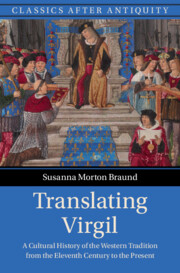 Translating Virgil
Translating Virgil Book contents
- Translating Virgil
- Classics after Antiquity
- Translating Virgil
- Copyright page
- Dedication
- Contents
- Prelude
- Acknowledgements
- Figures
- Tables
- Abbreviations
- Chapter 0 First Attempts and First Principles
- Chapter 1 Translation, Nationalism and Transnationalism
- Chapter 2 The Translator’s Identity
- Chapter 3 The Economics of Translating Virgil
- Chapter 4 Competition, Retranslation and Travesty
- Chapter 5 Poetic Careers of Virgil Translators
- Chapter 6 Partial Translations of Virgil
- Chapter 7 Supplements and Paratextual Material
- Chapter 8 Fidelity of Form: Metre Matters
- Chapter 9 Fidelity of Concepts and Register
- Chapter 10 Equivalences and Identifications
- Book part
- Bibliography
- Index
Chapter 2 - The Translator’s Identity
Published online by Cambridge University Press: 15 May 2025
- Translating Virgil
- Classics after Antiquity
- Translating Virgil
- Copyright page
- Dedication
- Contents
- Prelude
- Acknowledgements
- Figures
- Tables
- Abbreviations
- Chapter 0 First Attempts and First Principles
- Chapter 1 Translation, Nationalism and Transnationalism
- Chapter 2 The Translator’s Identity
- Chapter 3 The Economics of Translating Virgil
- Chapter 4 Competition, Retranslation and Travesty
- Chapter 5 Poetic Careers of Virgil Translators
- Chapter 6 Partial Translations of Virgil
- Chapter 7 Supplements and Paratextual Material
- Chapter 8 Fidelity of Form: Metre Matters
- Chapter 9 Fidelity of Concepts and Register
- Chapter 10 Equivalences and Identifications
- Book part
- Bibliography
- Index
Summary
I consider whether particular translators are situated inside or outside the hegemonic culture of their society. Salient factors include religious affiliation, level of education, class and gender. I offer in-depth analysis of the first translations of the Aeneid into English, down to Dryden, and then two cases from continental Europe, one in French, one in German, where the religious affiliations of translators affect the fate of their translations. Two cases of translations of the Georgics written on the margins of empire (in Tunisia and Singapore) challenge notions of centre and periphery. In the final section, I address the question of gender, noting that there have been remarkably few female translators of Virgil: I consider two sixteenth-century French translators and two early nineteenth-century translators of the Aeneid. Then I turn to modern translations of the Georgics, where women are unusually well represented but often marginalized. I conclude the chapter with discussion of the only female translator of the Eclogues I have identified.
Information
- Type
- Chapter
- Information
- Translating VirgilA Cultural History of the Western Tradition from the Eleventh Century to the Present, pp. 121 - 205Publisher: Cambridge University PressPrint publication year: 2025